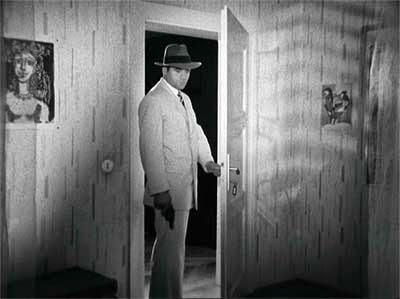Rainer
Werner Fassbinder, 1970
Starring:
Karl Scheydt, Elga Sorbas, Jan George
"W
as in war, A as in Alamo, L as in Lenin, S as in science fiction, C as in
crime, and H as in Hell."
Ricky,
a Vietnam vet with an American solider father and a German mother, returns to
Munich after the war. He is convinced to take a job as a hit man; he’s hired by
three disgruntled policemen under pressure to close out a few undesirable
cases. Between killings, he has several liaisons with women, visits his icy
mother and disturbed brother, and reunites with his beloved friend Franz. But the
German underworld proves to be a place of violence and betrayal where no one,
not even Ricky, is safe.
Based
on a one-act play that Fassbinder wrote and directed, The American Soldier is an altered version adapted for the screen. It
is also supposedly based on Irving Lerner’s 1958 film noir, Murder by Contract. A man takes a job as
a contract killer when he needs money, but his two contacts eventually betray
him. The American Soldier was initially
supposed to be a vehicle for Fassbinder’s then-boyfriend Günther Kaufmann (Gods of the Plague), but as their relationship
began to self-destruct, he reimagined the production. Some biographical
elements remain – Kaufmann had an American G.I. father and a German mother,
though Karl Scheydt. Though he was new to the Anti-Theater group and this was
his first film, he would go on to appear in later films like The Niklashausen Journey and Merchant of the Four Seasons.
Many
other members of his regular troupe appeared, including director Marguerethe
von Trotta as a maid, Ulli Lommel as a gypsy, Igrid Caven as a nightclub singer,
Irm Hermann as a whore, and Kurt Raab as Ricky’s brother. The American Soldier is certainly one of Fassbinder’s most violent,
abrasive films. The cast of characters – whores, dirty cops, gamblers, gypsies,
and more – are straight off the pages of a pulp novel. This is also more overtly
misogynistic than his earlier films. Women are at best ignored, at worst
murdered. In one particularly grating scene, Ricky throws a prostitute out of
his car (presumably because she talks too much) and shoots her with blanks,
laughing at her fear and humiliation.
This
film makes up a loose trilogy with Love
is Colder Than Death and Gods
of the Plague. All three are influenced by American film noir and the
films of Jean-Luc Godard and Jean-Pierre Melville. Each has a slow build and
some sluggish moments within the script, but explosive social criticism. The
trilogy also all includes the character Franz Walsch. Played by Fassbinder in Love is Colder Than Death and The American Friend (and Harry Bauer in Gods of the Plague), Walsch is a minor
criminal, a wannabe outlaw and anti-hero. He is perhaps at his most charming
here as Ricky’s childhood friend and muscle. Their close-knit relationship is
the only example of genuine affection or tenderness within the film.
The
other relationships are violent, brief, or exploitative. Ricky is like a blend
of La Samouraï’s Jef Costello and Kiss Me Deadly’s Mike Hammer. He
treats other characters much like Spillane: though he does have some morals, he
manipulates women and is quick to explode with violence towards the citizens of
the underworld. Two of the film’s most fascinating scenes address this issue of
relationships. In the first, which blends humor and melancholy, a hotel maid (von
Trotta) interrupts a sex scene between Ricky and a temporary girlfriend to tell
a story about two doomed lovers – this is essentially the plot of Ali: Fear Eats the Soul (1974).
In the second scene, Ricky visits his very strange family, which includes his
cold, aloof mother and needy, autistic-seeming brother.
The
film’s moving theme song, “So Much Tenderness,” was written by Fassbinder and
his regular composer Peer Raben. Fittingly, Günter Kaufmann performed the
vocals. It is both poppy and haunting and works perfectly with the film’s
themes, as well as its incredibly transgressive conclusion. The film ends with
a four-minute, slow-motion death scene that must be seen to be believed: Ricky’s
brother rolls around with Ricky’s body as he dies, in a blending of sexual
agony and grief.
The American Soldier will certainly be an acquired
taste, but it is one of Fassbinder’s most haunting early works. It comes recommended and should be
particularly enjoyable for anyone who has a love of film noir. Find it in Eclipse Series
39: Early Fassbinder from
Criterion, which also contains most of his other early films, including Love
is Colder Than Death, Katzelmacher, Gods of the Plague, and Beware
of a Holy Whore. The whole set comes highly recommended, though it would
have been nice for Criterion to throw in some extras.


No comments:
Post a Comment